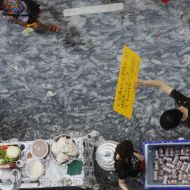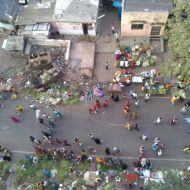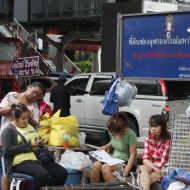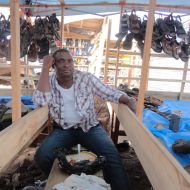Tricycle Drivers Get Paid in Burgers, But Not Much Cash
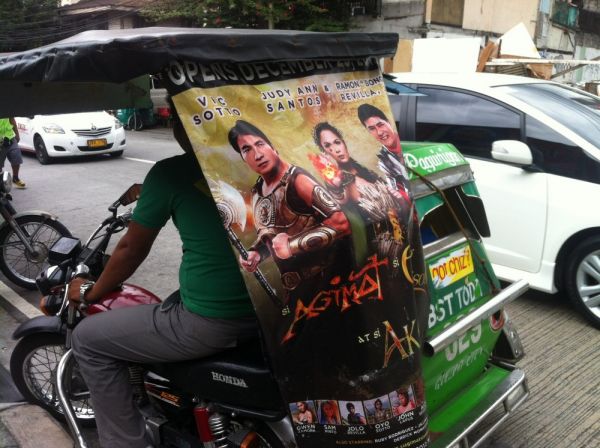
Tricycle ads are one of the least expensive forms of advertising in Manila, but even at their bargain price they’re more expensive than they used to be. Photo credit: Purple Romero
In 2012, Tomas Baguiringan, a tricycle driver in Metro Manila, got free tickets to Si Agimat, si Enteng at Ako (The Amulet, Enteng and I), one of the biggest Philippines blockbusters of that year. He wasn’t part of the cast or the production team, nor was he a friend or family to either of the two dashing stars. As one of the 263 tricycle drivers who ply the Barangay South Triangle, one of the busiest commercial areas in Quezon City, Baguiringan was a rolling promoter for the film, the ads for it plastered on the side of his bike. The tickets were part of his pay.
That year, 168 of these tricycles carried the tarpaulin emblazoned with the film’s title as they breezed through the district’s streets and past the country’s top two major networks, ABS-CBN Broadcasting Corp. and GMA-7. Barangay South Triangle’s 12,000 residents saw the ads everywhere as Baguiringan and his fellow tricycle drivers carried them on their vehicles up to 12 hours a day.
Each of the drivers who carried the ad was paid P100, or about $2.46 USD, which adds up to less than $500 USD. Compared to the hundreds of thousands of pesos that the advertisers spent on TV and radio ads, this was a marketing coup for the film’s publicity team. Baguiringan said they were paid an additional $4.91 each when the campaign was over, and were given two free movie passes.
Tricycle ads are one of the least expensive forms of advertising in Manila, but even at their bargain price they’re more expensive than they used to be. When Baguiringan first started working as a tricycle driver eight years ago, he said they received a request at least once a month to have ads hung on their vehicles. At the time they would agree to carry the ads for free. Eventually, however, the drivers got together and passed a resolution setting $2.46 as their minimum fee for advertising. It’s a very small sum, but Baguiringan said the drivers were mainly looking for some form of “appreciation.” (To put that in perspective, the film they promoted ultimately grossed $11.5 million USD – the $4.91 they received for promoting it could have bought them just one ticket).
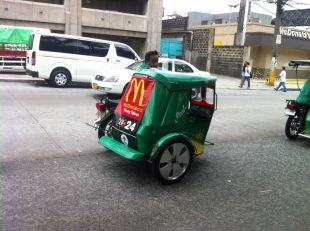
Free burgers are part of the drivers’ payments for carrying McDonald’s ads. Photo credit: Purple Romero
There are no formal contracts or conditions in most of these arrangements. The payments and duration of the advertising period vary from one company to another. But as informal as it may be, Baguiringan believes tricycle advertising to be among the most effective Manila has – there’s no need to work hard to attract eyes when hundreds of pairs of eyes are looking for you.
Manilans of all stripes use tricycle transportation. Al Amida, an employee in a parish in Barangay South Triangle, says the tricycle is the cheapest, most convenient way of getting around the closely knit neighborhoods. The vehicles seat five, and passengers have the option of paying a mere 20 cents USD each if they are willing to ride with others, or 50 cents each if they want to go solo.
“They take you right in front of your doorstep,” Al Amida says. Cab fares, by comparison, include a flagdown rate of one dollar, and that’s before the car even starts rolling.
The tricycles lined up along the side of the road in Barangay South Triangle advertise products, fast food and events. Arnold Samela’s tricycle carries a tarpaulin advertising McDonald’s, the familiar yellow “M” right above the address of the franchise’s newest branch in Quezon City. “Do you know what kind of privileges we get for putting it there?” Samela says. “We get a free meal of chicken and rice twice a month!” He says the branch manager keeps a list of the license numbers of the tricycles that carry his ads.
Samela, who has been working as a tricycle driver for 12 years, considers this no small perk. A tricycle driver earns $12 to $14 USD per 12-hour day – just barely enough also to cover the skyrocketing prices of gasoline, food, electricity and water. Baguiringan says they also get free burgers from McDonald’s each time they hold a general meeting there, which is at least once a month.
Other ads promote shops selling car parts, private schools and spaces being rented out in the city. Gone at this point, however, are the campaign ads that used to dominate the trikes’ spaces years ago.
In the heat of the local elections, the candidates would post their tarpaulins all over the tricycles. In 2010, deposed president Joseph Estrada – a former actor who won by a landslide in the 1998 presidential elections by using a jeep as a symbol of his pro-poor campaign – used the tricycles in his bid to reclaim the highest post in the land.
Reeling from a conviction for plundering city coffers in 2007 and so-so approval ratings, Estrada was having a hard time generating campaign funds. His campaign manager got the idea of tapping the three million strong tricycles in the country as his on-the-ground campaign promoters. His campaign met with the associations of tricycle drivers in voter-rich areas all over the country to convince them to be part of this strategy. Each tricycle driver was paid $4 USD for each meeting.
It was not only Estrada who utilized the active presence of tricycles on the streets – candidates running for lower posts did too. Baguiringan said they were selective, however – they only agreed to advertise for candidates who have supported them. “We say no to those who didn’t do anything for us,” he says.
For instance, he says they helped out Quezon City’s incumbent Mayor Herbert Bautista and his running mate, Joy Belmonte, as well as a handful of candidates seeking lower positions because they assisted them organize their association.
Campaigning through public transportation was banned by the Commission on Elections (Comelec) in 2001, but the ban is only now being implemented. No one among the tricycle drivers wants to risk losing their moneymaker by violating the rule. Comelec spokesman James Jimenez says that vehicles caught carrying campaign materials could be impounded if they don’t remove the ads after being given a warning.
So now the streets – at least those of Barangay South Triangle – are not filled with faces of politicians. They are, however, rich with moving ads, courtesy of the ubiquitous tricycles. Baguiringan’s passenger could very well be his client’s next customer.

